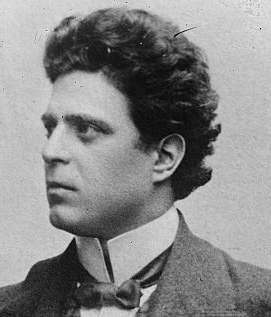REVIEW POTPOURRI: Pietro Mascagni
 by Peter Cates
by Peter Cates
Pietro Mascagni
Italian composer Pietro Mascagni (1863-1945) experienced the most extraordinary success when, at the age of 28 in 1891, his opera Cavalliera Rusticana was premiered in Italy. It would receive over 14,000 productions between then and the beginning of World War I in 1914.
It is one of my six currently favorite operas, the others being Mozart’s Marriage of Figaro, Puccini’s La Boheme and Tosca and Verdi’s Rigoletto and Simon Boccanegra.
Mascagni would compose 14 more operas, none of them achieving quite the same success.
Lodoletta was given its first production in 1917, achieved a few more, including a Met Opera staging. But in recent years, it has been largely forgotten.
The opera is based on Two Little Wooden Shoes by the English novelist Maria Louise Rame (1839-1908) who used the pen name Ouida. It recounts the tragic love story between the Dutch maiden Lodoletta and a French painter Flammen who is visiting friends at Lodoletta’s birthday celebration – Lodoletta rejects the painter after he suggests that they live together, but later changes her mind, pursues him to Paris where, upon seeing Flammen at a New Year’s Eve party surrounded by other women, she falls down in the snow from despair and perishes.
The opera’s first and thus far only recording is a 1990 set of two CDs (Hungaroton HCD 31307/31308) and features soprano Maria Spacagna in the lead role, tenor Peter Klein as Flammen and the late Charles Rosekrans the chorus and orchestra of the Hungarian State Opera. The recording was bankrolled by Westchester Opera, currently known as Taconic Opera, and based in New York’s Westchester County.
While not having the same level of melodic inspiration and general excitement of Cavalliera, Lodoletta was scored with intriguing sonorities, colorful instrumentation and moments of vocal beauty.
Soprano Spacagna sang exquisitely, Maestro Rosekrans, who directed the Houston Grand Opera for several years during the 1970s, conducted with tremendous power and drew highly responsive playing from the Budapest musicians; unfortunately tenor Klein tended to belch his notes with an annoyingly over expressive manner, much too similar to the overrated Placido Domingo of Three Tenors fame.
Mascagni struggled most of his life with depression. Like his on again/off again Giacomo Puccini (1857-1924), he opposed Italy’s involvement in World War I. Later after Benito Mussolini (1883-1945) seized power in his 1922 March on Rome with his Fascist followers , Mascagni, along with several other Italian composers and musicians, publicly accepted the honors and stipends that Il Duce bestowed on them yet privately became quite disenchanted with the government by 1935. An opera produced that year, Nerone, was based on the life of Emperor Nero, and intended as a depiction of Mussolini who in turn became upset with the composer. When the dictator personally expressed this displeasure and began pressuring Mascagni to withdraw the production, Mascagni told the dictator where to stick it in so many words. Due to Mascagni’s world fame, he was not arrested.
The above-mentioned novelist Ouida achieved fame in London society for her gatherings of famous writers, including Robert Browning, Swinburne and Oscar Wilde. She was described as possessing a “sinister, clever face” and speaking with a “voice like a carving knife.”
Responsible journalism is hard work!
It is also expensive!
If you enjoy reading The Town Line and the good news we bring you each week, would you consider a donation to help us continue the work we’re doing?
The Town Line is a 501(c)(3) nonprofit private foundation, and all donations are tax deductible under the Internal Revenue Service code.
To help, please visit our online donation page or mail a check payable to The Town Line, PO Box 89, South China, ME 04358. Your contribution is appreciated!



Leave a Reply
Want to join the discussion?Feel free to contribute!